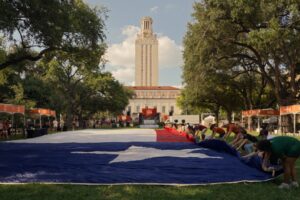AUSTIN, Texas—The family of the late Army Master Sgt. Roy P. Benavidez, a Medal of Honor winner, has donated his papers to the Center for American History’s Institute for Studies in American Military History at The University of Texas at Austin.
Benavidez received the Medal of Honor for his heroism in the Vietnam War. He saved the lives of at least eight men during a daring rescue in the jungles near Loc Ninh, Vietnam, and was critically wounded.
Benavidez received the Distinguished Service Cross, but the medal was upgraded to the Medal of Honor when the full story of his actions emerged. The late President Ronald Reagan awarded him the Medal of Honor in 1981 for bravery under enemy fire. Benavidez died Nov. 28, 1998, in San Antonio, Texas. Notable material in the Benavidez collection includes speeches, photographs and numerous papers documenting his actions in Vietnam and his 1983 testimony on Capitol Hill convincing Congressional leaders to veto reductions in Social Security benefits for veterans.
Benavidez’s son Noel said, “It is an honor for our family to donate dad’s papers to The University of Texas at Austin. We hope that students, researchers and the general public will learn about dad’s devotion to his beloved family, the military, his fellow veterans and his community, as well as his tireless efforts to keep kids in school and away from drugs and gangs.”
Benavidez spent his later years speaking to young people about the importance of education. The orphaned son of a South Texas sharecropper, Benavidez dropped out of middle school to pick sugar beets and cotton. In his autobiography, “Medal of Honor: A Vietnam Warrior’s Story,” Benavidez wrote, “I tell these students that an education and a diploma are the keys to success. I tell them I paid a large price for leaving school early. It was a bad decision on my part, and I have paid dearly for it my entire life. I had a good mind and I sold myself short.”
Despite these hardships, Benavidez believed, “Only in America could I, a young Hispanic-Indian American, have risen to my place.”
Three elementary schools in Texas, a park in Colorado and the naval ship USNS Benavidez have been all named in his honor. In 2001, the Texas legislature honored Benavidez with the Texas Legislative Medal of Honor, and the Hasbro toy company released the Roy P. Benavidez G.I. Joe action figure, the first G.I. Joe to portray a soldier of Hispanic heritage.
Dr. Tom Hatfield, head of the Center’s Institute for Studies in American Military History, said, “We’re grateful to the family for choosing us as a repository for Master Sgt. Benavidez’s papers. This is a significant collection not only for students of military history, but for those interested in the histories of Hispanic and Native American Texans as well. This collection will add to our understanding of war, especially the Vietnam War, and serve as a basis for the history books, novels and films of tomorrow.”
The Center for American History facilitates, sponsors and supports teaching, research and public education in U.S. history. In support of its mission, the Center acquires, preserves and makes available for research archival, artifact and rare book collections and sponsors exhibitions, conferences, film and video documentaries, oral history projects, grant-funded research and publications. The Center’s resources and services support the university’s curriculum and university faculty, student and staff research, as well as research by the public.
The Studies in American Military History portfolio includes research projects and publications, conferences and symposia, and international study trips related to the Second World War. A primary focus of the Institute is to instill in current and future generations of educators an enlightened understanding of how military engagements shape our political, cultural and societal landscapes.
For more information about the Roy P. Benavidez papers or the Institute for Studies in American Military History at the Center for American History, contact Echo Uribe, 512-495-4472.
For more information contact: Ramona Kelly, Center for American History, 512-495-4696.



